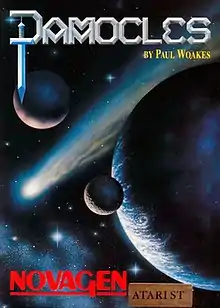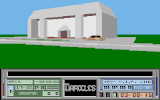Damocles (video game)
Damocles is a video game developed by Novagen in 1990.[3] It is the second game in the Mercenary series.
| Damocles (video game) | |
|---|---|
 | |
| Developer(s) | Novagen Software |
| Publisher(s) | Bethesda Softworks[1] |
| Designer(s) | Paul Woakes |
| Artist(s) | Mo Warden |
| Platform(s) | Amiga, Atari ST |
| Release | May 1990[2] |
| Genre(s) | Action-adventure |
| Mode(s) | Single-player |
Gameplay
Once again, the player is stranded on a planet, Eris, with an inoperable spacecraft. Unlike the first game, however, the scope of Damocles is considerably widened, offering the player an entire solar system to explore (the Gamma System; the player's original destination before the Interlude on Targ). There is also a race-against-time element to the game as a comet, the eponymous Damocles (a reference to the Sword of Damocles), is hurtling towards Eris. The player is encouraged to both escape Eris and find a means to prevent Damocles from destroying the planet, if possible without destroying the comet. Although an obvious, but destructive, solution exists, Damocles has no fewer than five distinct solutions.[4]
Damocles includes orbital mechanics in the game physics. While also featuring less standard physics (e.g. teleportation), it includes a detailed representation of the dynamics of the Gamma System and even includes a simplified form of special relativity. To cross the solar system in reasonable (to the player) time, time dilation occurs. However, given that the player has only a few hours to save Eris, extended periods at near-light speed are unwise. One of the game's many solutions even involves manipulating various planetary bodies in order to make use of the changes in gravitational pulls to divert the Damocles comet. From an aesthetic point of view, the inclusion of celestial physics allows the player to experience attractively-rendered sunrises and sunsets while on planet surfaces as well as various satellite occultations.
Setting
Damocles contains many real-world references, particularly drawn from the UK in the 1980s. For example, the president of the planet Eris is named Margaret, after Margaret Thatcher (British Prime Minister from 1979 to 1990); there is a bank called Lawson Bank, after Nigel Lawson (British chancellor of the exchequer from 1983 to 1989, though a real Lawson Bank does exist).[5] Some of the references are more elusive; for example, several stores are called "GUM Stores", after the real Russian Gosudarstvennyj Universalnyj Magazin department stores, but the fictional planet of Eris is not a reference to the real-life dwarf planet of the same name, as the latter was only discovered in 2005, some 15 years after the release of Damocles.
Despite these references, the game universe has no actual connections with Earth, since the player is given information that the Gamma System was actively explored before the present day (e.g. on approaching a particular moon, Benson informs the player that a space flight company was already present there in 1190). According to the poster that accompanied the game, the events of Damocles take place on 27 April 2099.
Development and release

Damocles was released on the Atari ST and Amiga platforms in 1990. Development on the game started as early as 1987.[6] Commodore 64 and ZX Spectrum versions were originally in development but eventually cancelled as a consequence of the declining 8-bit market. Unlike Mercenary, Damocles represented the game environment using filled polygon graphics, allowing a both more realistic and colourful world. An improved, fully texture mapped IBM PC version was in an advanced stage of development and scheduled for release in 1995, but was ultimately cancelled by Psygnosis.
Reception
Judith Kilbury-Cobb for Info said: "I would like to see more in the way of sound effects, but I still enjoyed this one a whole lot".[7]
John S Davison for Page 6 said: "For me Damocles has everything – top notch presentation, excitement, depth, lots of humor, addictiveness... I could go on forever!"[8]
Eugene Lacey for Commodore User described "Amiga gaming at its very best".[9]
Eugene Lacey for ACE said that "Damocles has everything – the thrill of discovery, the fun of exploration, a totally believable world, a tough challenge, and even the odd bit of blasting".[10]
Amiga Format wrote: "Whether or not you like 3D space adventures, Damocles is an experience not to be missed".[11]
Zzap! claimed the game is "a superlatively polished, amazingly large and challenging adventure brought to life through amazing 3-D 16-bit graphics".[12]
Brian Nesbitt for Computer and Video Games concluded: "Fluid solid 3D graphics generate a wholly believable environment which is a joy to explore, and the unique feeling of being there is exemplary".[13]
Robin Hogg for The Games Machine gave a positive review for the game, saying "Welcome back Mercenary, you've been away for far too long".[14]
Neil Jackson for ST Format stated that "Damocles keeps pulling you back to the screen, no matter how much you want to go to bed".[15]
Reviews
- K 13 (Italian)[16]
- Aktueller Software Markt (German)[17]
References
- Olafson, Peter (January 1, 1991). "Damocles". Amiga World Vol 7 No 1. Retrieved December 11, 2021.
- "Show Reports". Info Magazine. September 1990. p. 61. Retrieved August 3, 2022.
- Cales, Tony (June 15, 2014). "Mercenary retrospective". Eurogamer. Retrieved December 12, 2021.
- Guyart, S.; Hurt, A.; Garycki, P.; Berry, S.; Sachs, M. (2004). "The Hitchhiker's Guide to Damocles: The five ways to win". The Mercenary Site. Retrieved 2009-06-23.
- "Lawson Bank". Lawson Bank. Retrieved 20 April 2018.
- Schofield, Jack (October 1, 1987). "An A to Z of PCW". The Guardian. p. 15. Retrieved December 12, 2021 – via Newspapers.com.
- "Info Magazine Issue 34". November 29, 1990 – via Internet Archive.
- "Page6 46 Oct90" – via Internet Archive.
- "Commodore User Magazine Issue 074a" – via Internet Archive.
- "ACE Issue 27 Dec 89/ACE_Issue_27_Dec_89p" – via Internet Archive.
- "Amiga Format Screenplay 1 1990 Future Publishing GB" – via Internet Archive.
- "Zzap! 64 Issue 059 (HQ)" – via Internet Archive.
- "Computer and Videogames Magazine Issue 097". November 29, 1989 – via Internet Archive.
- "The Games Machine Issue 028" – via Internet Archive.
- "ST Format - Issue 013 (1990-08)(Future Publishing)(GB)". August 29, 1990 – via Internet Archive.
- "K 13/page/n35/mode/2up". Glénat – via Internet Archive.
- "Aktueller Software Markt - Ausgabe 1990/10" – via Internet Archive.